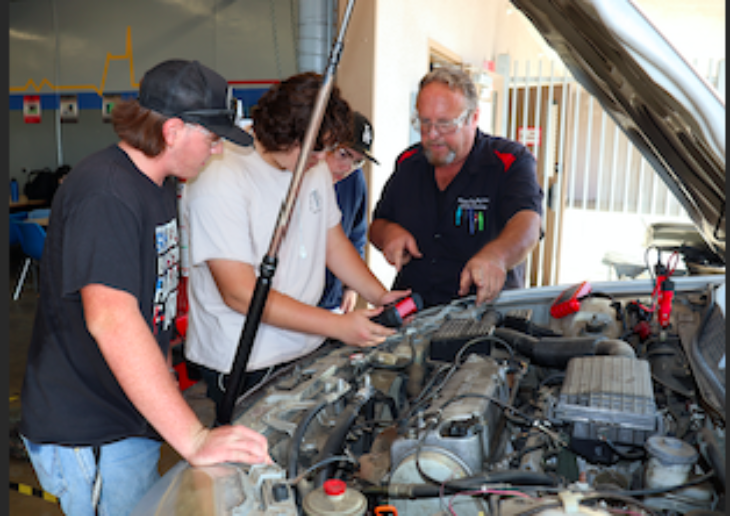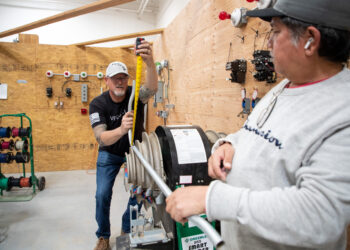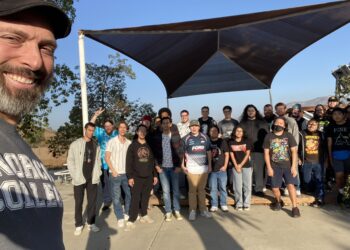Pedal to the Metal: Murrieta Valley High School’s Automative Technician Program Primes Students for College and Career Success

Murrieta Valley High School CTE students aren’t only building up their basics — they’re laying a foundation for their future careers.
The CTE pathways within the Murrieta Valley Unified School District give students the opportunity to experience hands-on learning while paving a clear career pathway in critical regional industries. Students can then enter directly into workforce after graduating high school or move forward into high-powered programming at regional community colleges.
CTE pathways include pathways in transportation, engineering and design, hospitality, tourism and recreation, business and finance, health science and medical technology, and a newly added fire science and technology pathway.
Just last year, over 2,700 students partook in these comprehensive CTE courses within the Murrieta Valley Unified School District. In 2021, over 700 students left high school with valuable college credit under their belts.
The automotive service technician sector is available through the transportation CTE pathway. Students enrolled at Murrieta Valley’s automotive service technician courses can earn valuable certifications by the time they graduate, setting students apart when it comes time to apply for jobs.
“I think all the more certifications … the better off they are,” says Murrieta Valley High School automotive instructor, Richard Slocum. “They’re going to have to have something that shines, other than a high school diploma.”
The automotive service technician courses provide a clear pathway to a career, college, or post-secondary program. With partnerships among regional community colleges, the courses help make students’ transition into post-secondary programming seamless. For example, the automotive and transportation program at Mt. San Jacinto College is articulated with the Murrieta Valley High School’s automotive courses.
Mt. San Jacinto College’s automotive instructor and program chair, Robert Pensiero, says students with a high school CTE background in automotive technology enter “much better prepared” than students without any educational background in the automotive industry. “If a student who has no high school training enters our college program, they often are hardly able to tell the hood from the trunk,” jokes Pensiero.
“Students, like [Slocum’s], make much more successful candidates, have demonstrated interest in the field of study, and are much easier to train than someone who comes to us lacking that knowledge.”
Ready with a strong foundation in the fundamentals, students enrolled in the automotive courses at Murrieta Valley High School come into the college-level programming ready to put their skills to work.
According to the California Department of Education, about 79 percent of high school CTE students are more likely to enroll in college or post-secondary programs within two years of graduating when compared to non-CTE students. These CTE students are helping provide a pipeline of ready, skilled workers to the region while moving forward into successful careers.
Murrieta Valley High School’s automotive pathway focuses on essential skills students need to enter the automotive industry as technicians and mechanics. With the latest equipment, Slocum walks his students through the basics before working up to more advanced skills, like Snap-On training, meter reading, oil changes, and more.
“At the first level … I teach a lot of safety, so they’re aware of their surroundings and what they’re doing … And then they go right into lifting cars, putting them on jack stands, removing tires, and re-torquing them.”
“I keep them busy,” states Slocum proudly. “They’re non-stop learning techniques.”
With a detailed background on the basics, students tackle more advanced mechanics, including performing oil changes and learning about cooling systems, before moving into skillsets like electrical and circuit building.
With automotive service technicians and mechanics seeing over 7,500 projected annual job openings in California from 2018 to 2028, preparing the future workforce to thrive is vital. Slocum’s teachings give an extensive framework and hands-on learning approach for students to gain the essential skills for becoming certified automotive mechanics and technicians.
Slocum explains some of his students even move from the classroom into full-blown careers right out of high school. “Last year, all my interns got hired,” says the proud instructor.
Students who continue in the automotive program at Mt. San Jacinto College receive the opportunity to learn in the field through apprenticeship programs. The program offers students a chance for real-world learning, but also focuses on the importance of developing the interpersonal skills that originate outside the classroom.
“The apprenticeship program also imparts a number of ‘soft’ skills, including how to properly prepare a resume and succeed at a job interview,” explains Pensiero. “By the time they are finished working through all of those steps, our students are about as well-prepared for success in the automotive aftermarket industry as we can make them.”
And soft skills are essential in industries across the board. Examples of these skills include problem-solving, communication, leadership, and teamwork. These “softer” skills are developed through time spent working in the industry and can often get overlooked in the shadow of technical, or “hard” skills, while working in a classroom setting.
“To see [students] ‘grow up’ so to speak, at that level and then … they’re ready, they’re mature,” states Slocum. “They know what a job site is looking for … you make them put their nose to the grindstone.”
Slocum’s students have what it takes to get behind the wheel in the automotive industry. As they work their way through the workforce, they develop the necessary experience for the future automotive technology industry.
Mt. San Jacinto College is also keeping up — with automotive curriculum covering new hybrid and electric vehicle technology, maintenance, and helping prepare students to take and pass the ASE L3 Hybrid and Electric Vehicle Certification Exam.
With the addition of new California legislation banning the sale of gasoline powered cars after 2035, certifications in hybrid and electric vehicles are more prominent than ever.
“It is an entirely different sort of profession than it was when I entered into it some 40 years ago, and often students and their parents have an erroneous impression of what it is actually like,” says Pensiero.
“We need some good people to fill the positions of tomorrow.”
Sources:
https://www.cde.ca.gov/ci/ct/gi/cteschoolleaderfacts.asp
https://www.murrieta.k12.ca.us/site/Default.aspx?PageID=135
https://www.onetonline.org/link/localtrends/49-3023.00?st=CA
https://calmatters.org/commentary/2022/08/californias-ban-on-gas-powered-cars-wont-be-easy/



